Scholary publications, projects and books
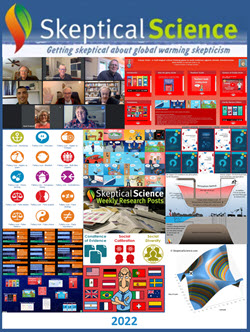
During 2022 a lot of cranky stuff happened like publishing multi-lingual versions of the Cranky Uncle game or creating resources leveraging Cranky Uncle cartoons. But it wasn't just Cranky Uncle who kept us busy during the year! As in previous recaps, this one is divided into several sections:
|
Scholary publications, projects and books |
 |
Several members of the SkS-team were lead- or co-authors of peer-reviewed and conference papers published during 2022. Here is a list of some of them:
Prospects for Detecting Accelerated Global Warming
Mark Richardson updated a classic paper Foster & Rahmstorf (2011) to see how much recent temperature change could be statistically explained by solar activity, volcanoes and El Nino/La Nina events in the Pacific. When you do that, it looks like global warming isn't just going on since 1980, but it might have accelerated. The textbook statistical error calculations suggest that global warming has accelerated recently, but he did some careful tests to confirm that the textbook calculations don't apply to the climate. Using slightly more advanced methods, we can't be as confident and cannot yet say that global warming acceleration is statistically significant. Published in Geophysical Research Letters in January.
Winters are changing: snow effects on Arctic and alpine tundra ecosystems
Robert Way is among the co-authors of Rixen et al. (2022) who reviewed the current knowledge of snow cover’s role for vegetation, plant-animal interactions, permafrost conditions, microbial processes, and biogeochemical cycling. Snow is an important driver of ecosystem processes in cold biomes. Snow accumulation determines ground temperature, light conditions, and moisture availability during winter. It also affects the growing season’s start and end, and plant access to moisture and nutrients. Published in Canadian Science Publishing in February.
Satellites Suggest Rising Tropical High Cloud Altitude: 2002 - 2021
Mark Richardson, R.J. Roy, M. D. Lebsock (Richardson et al. 2022) - Using measurements from MODIS instruments on two different satellites, we find that the highest clouds in Earth's tropics seem to be getting even higher in the atmosphere since the second MODIS instrument went up in 2002. The rising cloud height trend is a prediction of climate models, and is a way in which clouds reinforce warming. Published in Geophysical Research Letters in May.
Global maps of soil temperature
Robert Way is one of many co-authors of Lembrechts et al. (2022) who provide global maps of soil temperature and bioclimatic variables at a 1-km2 resolution for 0–5 and 5–15 cm soil depth. Other research in global change ecology relies heavily on global climatic grids derived from estimates of air temperature in open areas at around 2 m above the ground. These climatic grids do not reflect conditions below vegetation canopies and near the ground surface, where critical ecosystem functions occur and most terrestrial species reside. Published in Global Change Biology in May.
Cranky Uncle - a multi-lingual critical thinking game to build resilience against climate misinformation
Bärbel Winkler & John Cook - Oral presentation about the various facets of the Cranky Uncle game. EGU General Assembly May 2022 - Link to presentation
The Cranky Uncle game—Combining humor and gamification to build student resilience against climate misinformation
John Cook, Ullrich Ecker, Melanie Trecek-King, Gunnar Schade, Karen Jeffers-Tracy, Jasper Fessmann, Sojung Claire Kim, David Kinkead, Margaret Orr, Emily Vraga, Kurt Roberts and Jay McDowell (Cook et al. 2022). The paper documents several case studies in using the Cranky Uncle game to teach critical thinking, in both formal and informal education settings. Published in Environmental Education Research in June.
Comment on “World Atmospheric CO2, Its 14C Specific Activity, Non-fossil Component, Anthropogenic Fossil Component, and Emissions (1750–2018)”
Ken Rice, Gunnar Schade and Mark A. Maslin (Rice et al. 2022) as a response to Skrable et al. 2022 - Skrable et al. published a paper in Health Physics suggesting that only 12% of atmospheric CO2 is due to human emissions and that this was too low to be the cause of global warming. Ken Rice and Gunnar Schade, together with Mark Maslin, published a response pointing out that the large exchange fluxes between the atmosphere, ocean and biosphere meant that the human emissions would be well-mixed, but that this did not mean that the increase in atmospheric CO2 was not entirely due to human emissions. There were 4 other responses published that made similar, and related, points. Published in Health Physics in July.
Erroneous use of Statistics behind Claims of a Major Solar Role in Recent Warming
Mark Richardson and Rasmus Benestad (Richardson & Benestad 2022) - This paper comments on another one published by a large team called Connolly et al. They mistakenly claimed that they had some evidence of a big role for the Sun in recent global warming. We show that they made simple calculation errors, and when you fix the mistakes then their evidence supports a very small role for the Sun - and maybe even that the Sun has been trying to cool us down recently. Published in Research in Astronomy and Astrophysics in November.
Cranky Uncle - a multi-lingual critical thinking game to build resilience against climate misinformation
Bärbel Winkler & John Cook - iPoster presentation about the various facets of the Cranky Uncle game. AGU Fall Meeting, December 2022 - Link to presentation
New book: Wales - The Missing Years - a celebration of origin
John Mason - wrote a sequel to The Making of Ynyslas, guiding the reader on a journey through deep time, exploring the origins of the vital-to-existence features of our home planet. Long before the first multicellular life-forms made the transition from living in the sea to colonising the land, Earth had already been transformed - or, if you like, Terraformed. Wales may have been late on the scene in geological terms, but every atom and molecule making up the country, its rocks, seas, skies and diverse inhabitants alike, owes its origin to the Missing Years. This, then, is a story that belongs to everyone in Wales and, indeed, on Earth.
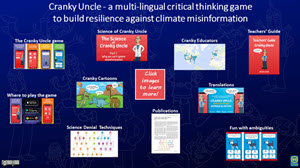 In May, Bärbel Winkler participated in the week-long European Geoscience Union's General Assembly in Vienna. She contributed a presentation about the Cranky Uncle game in session EOS1.3 Games for Geosciences. Check out Bärbel's EGU Diary for her recap of the weeklong conference from a science enthusiast's perspective.
In May, Bärbel Winkler participated in the week-long European Geoscience Union's General Assembly in Vienna. She contributed a presentation about the Cranky Uncle game in session EOS1.3 Games for Geosciences. Check out Bärbel's EGU Diary for her recap of the weeklong conference from a science enthusiast's perspective.
In June John Cook participated in "Fighting misinformation online" in Prague: Ideas exchange, hosted by the European University Institute, the Calouste Gulbenkian Foundation, Google and YouTube. This event, the second in our series, continued the debate around mis and dis-information by bringing together critical contributors from across academia, NGOs, media organisations, technology companies and governments.
In September, Bärbel Winkler travelled to Zürich, Switzerland to participate in the German language K3 Climate Communications conference where she led a workshop to introduce participants to the Cranky Uncle game and inoculation theory (Presentation PDF, German).
In December, Bärbel Winkler and John Cook presented an iPoster about the Cranky Uncle game at the American Geophysical Union's Fall Meeting held in Chicago and online. You can read about the session in the blog post AGU Fall Meeting 2022 - Cranky Uncle makes an appearance.
Margaret Orr, John Cook, Amanda Borth, Sean Sublette, Ed Maibach, Stephan Lewandowsky, Bob Lindmeier, Joseph, Trujillo Falcón published the handbook Climate Myth Debunking for Broadcast Meteorologists as a collaborative project with the Climate Matters Partnership in January.
John Cook collaborated with UNESCO to publish Addressing conspiracy theories: what teachers need to know, in the UNESCO Digital library in October. The document is a guide for teachers looking to address conspiracy theories and misinformation in the classroom.
As in previous years, members from our team published articles in various other outlets:
Dana Nuccitelli wrote 11 articles for Yale Climate Connections, and Stephan Lewandowsky published 4 articles in TheConversation.
Several team member were involved with online talks, presentations and podcasts during 2022. Here is a list of some of them.
| Date | Team member | Title and Link |
| January 26 | John Cook | The Mallen Baker Show |
| February 10 | John Cook | National Capital Area Skeptics (NCAS)) |
| February 18 | Bärbel Winkler | The European Skeptics Podcast (ESP) - Episode 313 |
| February 24 | John Cook | University of Washington Program on the environment |
| April 22 | Dana Nuccitelli | CCL Training: IPCC Sixth Assessment Report Updates |
| May 10 | John Cook | Cambridge Skeptics |
| June 28 | John Cook | Fighting Misinformation Online - Google News Initiative |
| July 16 | Dana Nuccitelli | CCL Training: Trees and Forests as Natural Climate Solutions |
| Nov 17 | Robert Way | Climate Services in Canada's North: Are We Doing Enough? |
During 2022 Cranky Uncle learned 7 languages which were launched with the multi-lingual version in three releases: Dutch and German as v2.0 in February, Spanish and Portuguese as v3.0 in August and French, Italian and Swedish in December as v3.1. These translations were created by volunteer translator teams scattered around the globe and put together by the professional team of creative agency Goodbeast. The recently updated blog post Cranky Uncle now speaks 8 languages with French, Italian and Swedish added! explains the game's history and goes into fascinating details of what all is involved with these translations and especially the "fun with ambiguities" the translator teams had!
In addition to the game itself, several resources for educators were made available in English, Dutch and German. Among these resources is The Teachers' Guide to Cranky Uncle which saw at least 760+ downloads for the English original, 605 for Dutch and 1,020+ for German since we started collecting the information a few months ago. Over time, we hope to add more multi-lingual resources for educators around the globe.
And a spin-off!
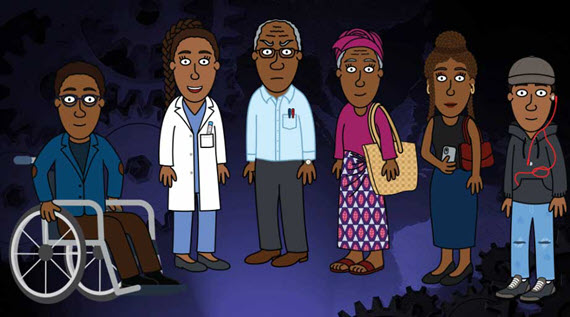
During 2022, the Cranky Uncle team has been working with UNICEF, the Sabin Vaccine Institute, the University of Nairobi, and Makerere University to develop a vaccine edition of the Cranky Uncle game for East Africa. This involved a series of co-design workshops in Uganda, Kenya, and Rwanda. Participants played the game, which targets common fallacies in vaccine misinformation, and offered feedback on how to make the game’s content and cartoon characters more culturally relevant in their country.
The detailed feedback from the workshops were synthesised and the game was updated. The following figure shows the final characters after incorporating the feedback from the co-design workshops.
Next steps are to pilot test the updated game in Uganda and Kenya, measuring the game’s effectiveness in increasing resilience against misinformation and vaccine knowledge. We are also planning a co-design workshop in Pakistan (the game has already been translated into Urdu).
Interactive poster about the game
The interactive iPoster created for the AGU Fall Meeting (see above) provides a comprehensive summary of the Cranky Uncle game's many aspects. The poster might be available via this guest view link. If it doesn't work, you can also download an interactive ppsx-version including the audio-files (18MB) or a smaller PDF file (3.6MB).
CARDS was used in a real live application during COP27 by the Climate Action Against Disinformation (CAAD) as one of a collection of tools to detect online climate misinformation. CAAD published daily briefings titled COP, LOOK, LISTEN and - if you are interested in almost real-time identification of misinformation - they are all available as PDFs and well worth a read via the overview page for the COP27-Bulletins.
Denial101x was again available throughout the year as one long-running self-paced version, attracting over 700 participants. This year's run will be available until February 28, 2023, so there's still ample time to work through the lectures if you decide to register now.
Carbon Brief Quiz 2022
On October 12 we participated for the third time in the annual Quiz Night organized by Carbon Brief. After the COVID-restrictions had lifted, the event took place at a bar in central London, but was held as a hybrid event to also allow teams to join onlinne via Zoom. Around 45 teams and several hundred participants had joined this fun competition from around the world. Compared to last year, when we ended up in 15th place with 75 points we were not able to establish an overall upwards trend, ending in 26th place with 49 out of 100 possible points. But, simply participating in an event like this is fun, so we plan to do so again next year with a hopefully bigger team to be able to cover a wider range of questions thrown at us! You can read about the event over at Carbon Brief where detailed stats are available as well as all the quiz questions and their answers.
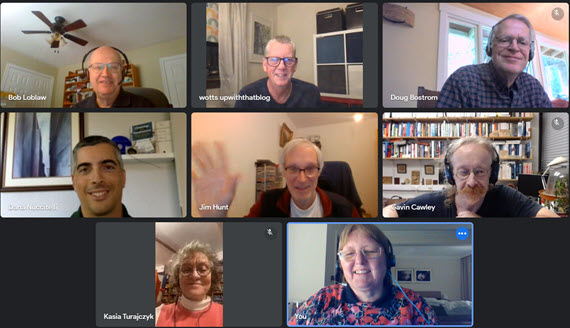
Several of our blog series kept getting published throughout the year. Bärbel Winkler continued publishing the weekly summaries of articles shared on our Facebook page until mid-September when John Hartz returned from his well-deserved break and resumed publishing these summaries. On most days, we shared 3 to 4 articles related to climate science and/or tackling misinformation and even though we don't have a calculated number will have shared at least 1,000 articles via that route all told.
Doug Bostrom and Marc Kodack cranked out another 52 editions of our weekly Thursday feature New Research, listing newly published academic research articles as well as high quality government and NGO reports. This past year we've listed 5,705 peer reviewed journal articles covering our fast changing of the climate and the myriad phenomena and challenges arising from our big mistake. We don’t have a perfect count due to data limitations but at least 34,353 researchers contributed to findings covered in these publications, in some 215 separate journals. A slightly discouraging note is that only 2,370 articles were published open access, 41% and a distinct drop from 2021’s 58%.
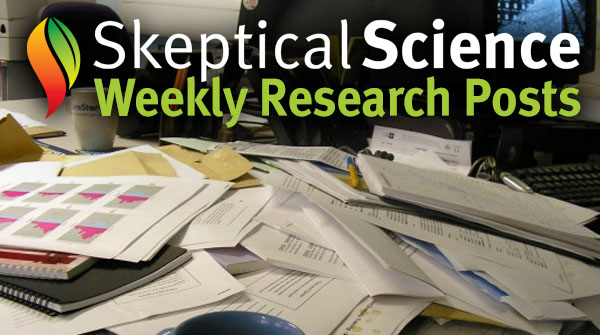
Dana Nuccitelli reposted his articles published in other outlets (see list above) and wrote several original articles for SkS. Evan and John Garrett (jg) published updated versions from their Analogies series and Evan also published several thought-provoking articles like The Climate Shell Game and Planetary Diets. Bärbel Winkler put together several blog posts announcing new resources to help debunk misinformation, like New graphics resources: Cranky Cartoons and Fallacy Icons or New resource: myth deconstructions as animated GIFs. Bob Loblaw contributed two detailed analyses of faulty papers prompted by questions received from our readers: A review of a paper by Ziskin and Shaviv and A Review of a paper by Ellis and Palmer. And, speaking of questionable papers, Ken Rice tackled a paper by a group of Italian scientists in which they "critically assessed extreme [weather] event trends". His conclusion: No, a cherry-picked analysis doesn’t demonstrate that we’re not in a climate crisis.
We also continued to repost selected articles from Melanie Trecek-King's website Thinking is Power as they provide a lot of foundational information related to critical thinking and the the very nature of science - what it is and why it is important.
In a never-ending "fight" against link-rot, Ken Rice updated many of our rebuttals to fix no longer working links. This often entailed searches for replacement links or browsing web-archives for archived versions of the target pages. You can actually help with this task by letting us know about broken links via the rebuttal feedback form available at the bottom of each rebuttal.
We've been keeping statistics of how often our rebuttals get accessed since January 2017, so have 6 years worth of data by now. During this time, there have been over 36.5 million views across all available rebuttals with about 3 million views in 2022 all told. The ten most viewed rebuttals during the year were (listed via their code): Model (+192K), Sun (+176K), Consensus (+163K), Thermo (+152K), Past (+136K), Lag (+102K), Impacts (+100K), Antarctica (+82K), CO2 (+75K), Saturate (+68K).
Apart from the translations for the multi-lingual version of the Cranky Uncle game mentioned above, translation activities during 2022, coordinated by Bärbel Winkler, were dominated by the various important and very timely handbooks: The Conspiracy Theory Handbook (Swedish, Romanian and Slovak), the The Debunking Handbook 2020 (Galician, Bulgarian, Greek, Slovak, Albanian and Macodonian) and The COVID-19 Vaccine Communication Handbook (Finnish). Some of these translations were created by SkS translator teams while others came about due to generous offers from outside our team. We recently published a summary blog post highlighting the ten(!) handbook translations published during 2022.
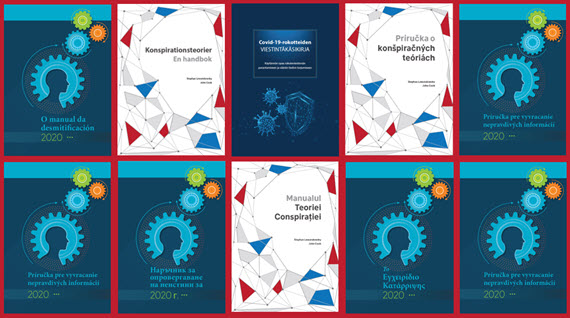
We can tell from our download statistics that these handbooks are very popular. Based on available data, The Debunking Handbook was downloaded at least 18,600 times across all available languages with German (5,770+), English (4,430+), Spanish (1,450+), Dutch (1,290+) and Portuguese (1,280) making up the bulk of the downloads. The Conspiracy Theory Handbook was downloaded at least 8,800 times with Swedish (1,900+), English (1,520+), German (1,000) and Romanian (870+) accounting for more than half of that. In addition, The Consensus Handbook was downloaded at least 1,370 times. Many more downloads will have occured from other websites where we don't have data for.
Together with our German language partner website Klimafakten.de, we published the Spanish translation of the FLICC-poster in July. This very helpful poster - a successful collaboration between Skeptical Science and Klimafakten. - is now availabe in English, German, Dutch, Portuguese and Spanish. More translations are currently in the works.
If you are interested to get involved with our various translation projects, please check out Join the Skeptical Science Translator Community! Is this something up your alley you’d like to help with? If your answer is 'Yes', then please let us know by filling out this short form. Bärbel Winkler will then be in touch to let you know about the next steps, depending on your preferences of where you'd like to get involved.
Our Facebook page has been doing fairly well with around 178,000 followers, but down a bit compared to 2021. We still try to share between 3 and 4 articles per day, selecting content focusing on climate science research or combatting misinformation. We also put together a series of daily postings, sharing one Cranky Uncle cartoon per day, which was quite well received according to the available stats and detailed in A Cranky Uncle Cartoon a day, keeps misinformation at bay!
On Twitter we have ca. 23,300 followers, so no change compared to a year ago. After Elon Musk's take over of the platform and the fallout of that, we discussed our options and decided that we’ll keep tweeting (for now) but have also started tooting (more about that below). Our main reason for this is outlined in the blog post:
"Skeptical Science’s entire purpose is to combat bunk about climate science. The climate science communications community already does a lousy job of penetrating spaces where it’s most needed. Here’s “most needed” staring us in the face. How does abandoning the field in a war involving a civilian population in harm’s way provide an identifiable net benefit?"
Because of the Twitter woes, we recently set up a presence on Mastodon a social networking (not social media per se!) platform specifically designed to be what social networking as most of us came to know it should have been in the first place: a public service, run by the public, for the benefit and good of the public. As we are focused on science communication, we picked the scicomm.xyz instance of Mastodon as our home base where you can find us "tooting" as @SkepticalScience. A good month after setting up shop on Mastodon we have about 1,200 followers there.
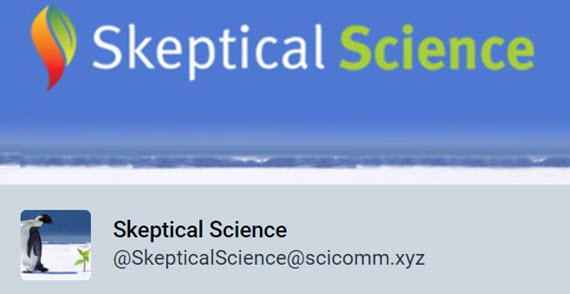
Our presence on MeWe, a relatively new social media platform which promises to stay ad- and tracking free has seen a sligth growth during the year and now has more than 1,850 followers. How about joining our other Followers on MeWe to further increase our base there as we head into 2023?
We have several more languages in the translation pipeline for the Cranky Uncle game with Albanian, Bulgarian, Finnish, Macedonian, Polish, Romanian and Turkish actively being worked on right now. Translations will become available as they are finalized, so this will be an ongoing process and it should be fun seeing Cranky Uncle "learning" more languages throughout the year!
Furthermore, Skeptical Science is working with a developer team in Berlin on a new app for the targeted and automated debunking of misinformation on Social Media. This is intended as a replacement for the unfortunately no longer available Skeptical Science App. A first version of this new app will be focused on Twitter, while later versions can take on other media channels as well. If things work out as planned, the Twitter version of the app should become available in the course of 2023.
As you read this, we are also embarking on coordinated projects to update our vast collection of myth rebuttals. This will include making their content more current where needed (like e.g. referring to IPCC AR6 instead of AR4) and to also add plain language "at a glance" sections to the basic rebuttal versions. Be on the lookout for more information about these activities and how you can get involved via providing feedback early next year!
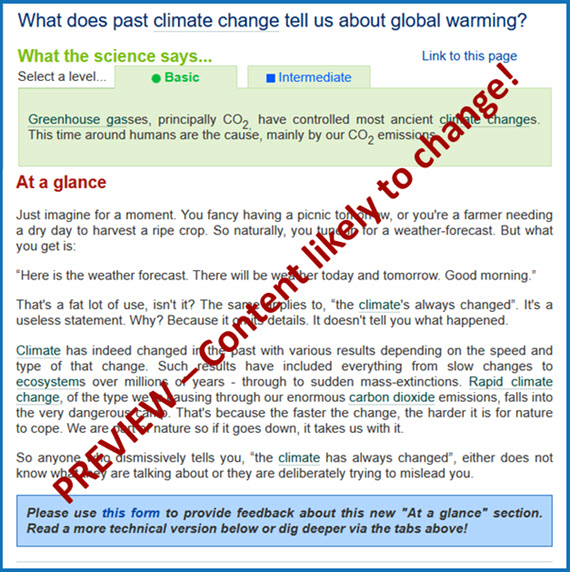
While we pride ourselves on running a highly efficient "all-volunteer" operation, the technical underpinnings of our internet-based publishing system require money for day-to-day operation as do some of our projects mentioned in this write up. You can help to propel Skeptical Science through another successful year of improving critical thinking skills as outlined below. For US taxpayers squeezing under the wire, contributions to Skeptical Science are tax-deductible.
| Skeptical Science is an all-volunteer organization but our work is not without financial costs. Contributions supporting our publication mechanisms from our readers and users are a critical part of improving the general public's critical thinking skills about science and in particular climate science. Your contribution is a solid investment in making possible a better future thanks to improving our ability to think productively, leading to better decisions at all levels of our climate change challenge. Please visit our support page to contribute. |
Translations of the FLICC-poster
| The FLICC-Poster is the result of a successful collaboration between Skeptical Science and our German partner website Klimafakten. It was first published in May 2020 and has been quite popular in English, German, Dutch, Portuguese, and Spanish since then. The creation of additional translations of the poster requires funding for professional design and layout work. You can contribute to that effort via the form provided on this page. |
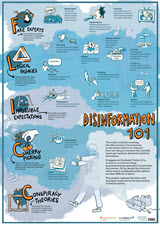 |
Translations of the Cranky Uncle Game
 |
The Cranky Uncle game adopts an active inoculation approach, where a Cranky Uncle cartoon character mentors players to learn the techniques of science denial. Cranky Uncle is a free game available on smartphones for iPhone and Android as well as web browsers. Even though the translations of the Cranky Uncle game are done by teams of volunteers, each language incurs costs for programming activities to get a language set up in the game. If you'd like to support Cranky Uncle "teaching" his science denial techniques in other languages, please use the dedicated form provided on this page to contribute. |
Thanks for reading and all the best for whatever 2023 has in store for us all!
Posted by BaerbelW on Friday, 30 December, 2022
 |
The Skeptical Science website by Skeptical Science is licensed under a Creative Commons Attribution 3.0 Unported License. |